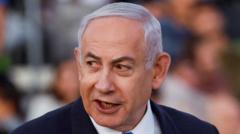The UK government acknowledges its legal obligations regarding the ICC warrant for Benjamin Netanyahu, while emphasizing the importance of maintaining diplomatic relations with Israel amidst calls for an immediate ceasefire in Gaza.
UK Government's Stance on ICC Warrant for Netanyahu: Legal Obligations and Diplomatic Dialogue

UK Government's Stance on ICC Warrant for Netanyahu: Legal Obligations and Diplomatic Dialogue
Downing Street confirms that Israeli Prime Minister Benjamin Netanyahu could face arrest in the UK following an International Criminal Court warrant issued for alleged war crimes in Gaza.
The UK government has indicated that Israeli Prime Minister Benjamin Netanyahu may face arrest if he enters the country, following the issuance of an international arrest warrant by the International Criminal Court (ICC) for alleged war crimes in Gaza. While Downing Street declined to comment directly on Netanyahu's situation, a spokesperson stated that the government would adhere to its legal responsibilities under the International Criminal Court Act 2001.
On the same day that the arrest warrant was announced, the ICC also issued a similar warrant for Yoav Gallant, Israel's former defense minister. The spokesperson noted that member countries of the ICC, including the UK, are bound by treaty obligations to act on such warrants. Although specific outcomes regarding detention were characterized as "hypotheticals," the government reaffirmed its commitment to comply with legal obligations stipulated by both domestic and international law.
The procedure outlined in the International Criminal Court Act mandates that if a warrant for arrest is received, a designated minister must present the request to a judicial officer, who would then review and potentially execute the warrant in the UK. The government, however, has not confirmed which government official would be responsible for this process or whether they are consulting with the Attorney General, Lord Hermer.
Despite the serious implications of the arrest warrant, Downing Street affirmed the importance of dialogue with Israel, labeling it as a vital partner across various sectors. This sentiment was echoed amidst discussions on strategies to address the ongoing conflict in Gaza.
Previously, Lord Hermer emphasized the need for his legal advice to remain free from political influence, clarifying that his role is to provide unbiased legal interpretation rather than to sway governmental decisions. In light of the warrants, the UK government has reiterated its respect for the ICC's independence.
The issuance of arrest warrants has sparked criticism, particularly from UK opposition figure Dame Priti Patel, who accused the ICC of creating a "moral equivalence" between Israel's recent military actions and the October 7 attacks attributed to Hamas. The response from the newly elected Labour government diverged from its predecessor, as it opted not to contest the ICC's authority to issue warrants, indicating a willingness to respect judicial processes.
The future of the warrants will depend significantly on whether the 124 member states of the ICC—excluding Israel and the US—choose to enforce the warrants. US President Joe Biden has described the warrant against Netanyahu as "outrageous," asserting that there is no parallel between Israel and Hamas. Meanwhile, officials from various European nations have expressed their support for upholding the ICC's decisions, indicating a complex interplay of legal obligations, political stances, and international relations amid ongoing conflict in the region.

















